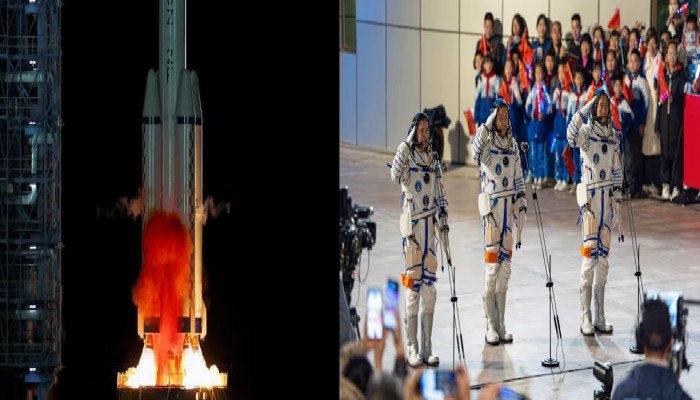China successfully launches Shenzhou-19 with new three astronauts to space station
- In Reports
- 02:31 PM, Oct 30, 2024
- Myind Staff
China launched the Shenzhou-19 spaceship on Wednesday, sending three astronauts, including its first female space engineer, on a six-month mission to further develop its low-Earth orbit space station. The Shenzhou-19, launched atop a Long March-2F carrier rocket, lifted off early from the Jiuquan Satellite Launch Centre in northwest China. Ten minutes after launch, the spacecraft separated from the rocket and successfully entered its designated orbit, the China Manned Space Agency (CMSA) confirmed.
“The crew members are in good shape, and the launch is a complete success,” announced the CMSA, adding that Shenzhou-19 will soon conduct a fast, automated docking with the front port of the space station's core module, Tianhe, in approximately 6.5 hours, forming a combination of three modules and three spacecraft.
The mission’s crew includes Commander Cai Xuzhe, astronaut Song Lingdong, and Wang Haoze, China's first female space engineer and the third Chinese woman to participate in a crewed space mission, according to the CMSA. Wang will oversee space experimental projects, cargo, and operations management, bringing a critical skillset to the mission’s scientific and operational objectives.
The CMSA spokesperson, Lin Xiqiang, explained that the crew will carry out 86 scientific and technological experiments across various fields, including space life sciences, microgravity physics, space materials science, and space medicine. Additionally, they will perform extravehicular activities, conduct maintenance on protective devices against space debris, and manage extravehicular payloads and equipment installation.
In recent years, China has pushed its space ambitions forward, constructing the space station after being excluded from the International Space Station (ISS) due to concerns over its military-run space program, led by the People’s Liberation Army (PLA). China now hosts the only space station in orbit, a role likely to increase in prominence as the ISS nears its scheduled retirement in the coming years.
This mission is part of a broader strategy announced earlier this month, where China laid out plans to further its space development goals, including a manned lunar mission, the establishment of a lunar space station, and exploration of potentially habitable planets and extraterrestrial life.
Beyond its national missions, China is extending international collaboration opportunities, including training astronauts from partner nations to participate in future missions. Lin remarked that the country is “engaging in discussions to select and train astronauts from partner nations,” with an astronaut from Pakistan expected to join upcoming missions.
“No matter which country participates, it is humanity’s collective quest to unravel the mysteries of the cosmos,” Lin added.
This mission marks another milestone for China’s space program, which has previously included historic achievements like returning lunar samples to Earth for analysis and successful robotic missions. With this crew rotation, the new team will relieve the current space station crew, continuing China’s ambitious goals to expand its presence in space.







Comments